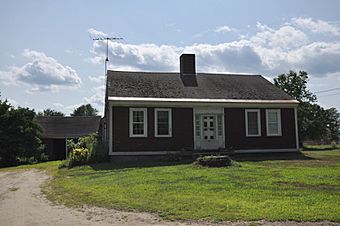Enoch Hall House facts for kids
Quick facts for kids |
|
|
Enoch Hall House
|
|
 |
|
| Nearest city | Buckfield, Maine |
|---|---|
| Area | 34 acres (14 ha) |
| Built | 1800 |
| Architectural style | Federal |
| NRHP reference No. | 93001431 |
| Added to NRHP | December 23, 1993 |
The Enoch Hall House is a very old and special house located on Bean Road in Buckfield, Maine. It was likely built around the 1790s. This house is famous because it was the home of Enoch Hall, one of the first people to settle in Buckfield. He was also a very active person in politics. He even helped write the Maine State Constitution in 1819!
The house is also known for its amazing murals. These are paintings drawn right on the walls of the second-floor hallway and bedrooms. They were probably painted around 1830, but no one knows who the artist was. Because of its history and unique art, the Enoch Hall House was added to the National Register of Historic Places in 1993.
Contents
What Makes the Enoch Hall House Special?
The main part of the house is a 1-1/2 story building made of wood. It's built in a style called "Cape form," which is a common type of house from that time. It sits on a strong granite foundation. The outside walls are covered with weatherboard siding, and it has a large chimney in the middle.
The front door is quite fancy, in a style called Federal. It has small windows on the sides and a panel above the door. Several smaller rooms have been added to the back of the main house over the years.
Inside the Historic House
Inside, the house has a simple layout. There's one room on each side of the central chimney. A small entryway is in front of the chimney. Behind it, you'd find the kitchen area.
In the back corners, there's a pantry and a small bathroom on one side. On the other side, a steep staircase leads upstairs. The room on the northwest side of the house has a more decorative fireplace. This suggests it was likely the most important room in the house. The designs around the fireplaces seem to have been added later. They look like patterns published in 1806 by an architect named Asher Benjamin.
The Mysterious Wall Murals
The upstairs of the Enoch Hall House is quite unusual. The only staircase to the second floor is not in the main entryway, which is where you'd normally expect it. Instead, a long, narrow hallway runs along the back of the upper level. This hallway leads to two bedrooms.
The bedroom on the west side has a curved plaster ceiling, like a barrel. All three of these upstairs areas are covered with many painted murals! The paintings show things like leafy trees, beautiful landscapes, and stenciled figures. These styles are similar to the work of an artist named Rufus Porter.
However, some of the things painted in the Enoch Hall House are not usually seen in Porter's work. For example, there are marine mammals (like whales or seals), two horses, and a striped cat playing with a mouse! Another traveling painter, Orison Wood, was suggested as the artist. But his style didn't quite match, so the artist remains a mystery.
Who Was Enoch Hall?
Enoch Hall was born in 1763 and passed away in 1835. He moved to Buckfield from Windham in 1783. He came to settle on this very property. Local stories say that he built this house nine years later, around 1792. The general style of the house supports this idea. However, the fireplace designs might have been added later, which makes the exact building date a bit unclear.
Enoch Hall was an important person in his community. He represented Buckfield in the Massachusetts General Court. This was like being a lawmaker for Massachusetts, as Maine was part of Massachusetts back then. In 1819, he was a member of the group that wrote the Maine State Constitution. This happened just before Maine became its own state, separate from Massachusetts. After Maine became a state, Enoch Hall served as a representative in the very first Maine State Legislature from 1820 to 1821.
 | Chris Smalls |
 | Fred Hampton |
 | Ralph Abernathy |



